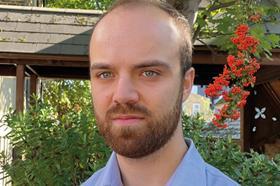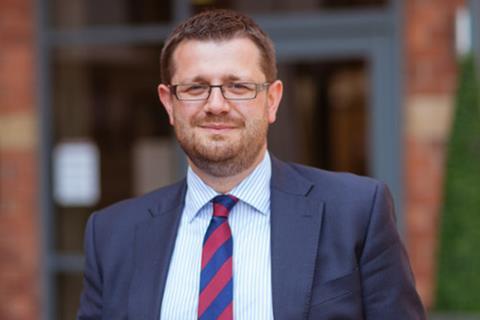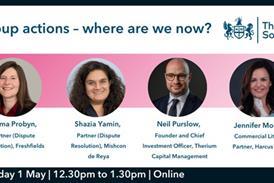Simeon Hance talks to Ian McCann about his life as a litigator, being an autistic lawyer, and how the sector can improve its treatment of neurodivergent people.

Ian’s first foray into the world of work was through a paper round, delivering free newspapers to his local community. This helped him kickstart his ability for sales as it “at least told you how to try and give people something that they didn’t want”.
Ian moved from the North East of England to London, at the age of 23, where he trained and qualified at the firm Baker McKenzie, and worked on a wide variety of litigation cases including pensions litigation, sports disciplinary law and multi-national fraud recovery. This offered Ian “a fantastic, fabulous grounding”, but after a few years he wanted to return to his Northern roots, and moved to a law firm in Leeds, although wasn’t sure about what he wanted to do in the long term:
“This is my career; I’m enjoying what I’m doing. But I looked at the other partners, and the whole sector around the law, and thought to myself, ‘is this what I want to do for the next 25 years?’ And I wasn’t sure.”
This led to Ian leaving the law profession and working in financial services for a short while. This turned out to be just the thing to convince him that working in the law was what he wanted. “We all make mistakes,” he explained while laughing. “I was offered the opportunity to set up a commercial litigation department for another firm, but I thought to myself, ‘if I do this well, they’ll get rid of me once it’s done, and if I don’t do this well, they’ll get rid of me instantly. Why not try and build this for myself?’”

One of his contacts happened to have just started setting up a firm – which would eventually become Legal Studio. Ian joined this firm as a consultant in 2015, bringing his existing client base with him, and has worked there ever since.
The culture
One thing Ian is passionate about is changing the culture of presenteeism, targets and long hours within law firms. Ian explained that “Steve Jobs said ‘why hire intelligent people and tell them what to do?’. The aim should be to bring people in and let them do what they have been brought in to do, in the way that best suits them. I love the law. I enjoy being a lawyer. What I struggled with was how I was meant to practice the law.”
Ian is openly autistic, and as part of this he has found he has a ‘spiky profile’. What this means is that he has some areas of incredible aptitude and other areas which pose much more of a challenge. But within traditional legal firms, Ian has found there is a widespread tendency to “regress people to the mean.” He explained: “in a performance review, it would be seen for example that someone was brilliant at client handling, but rubbish at drafting. So what happens is, rather than build on their strengths, the focus is put on their weakness, and their client-handling work is taken away, so they can focus more on their drafting. But with a neurodivergent mind, this just will not work. And not only will it not work, it will be incredibly frustrating for both employee and employer.”
Ian also notes that there is a tendency in the workplace to revert to stereotypes about neurodivergent people, and to focus on the extremes. “Take ADHD for example. When someone hears about ADHD, there is the mental image of a hyperactive, delinquent teenage boy. They don’t see Simone Biles, an Olympic winning gymnast, who also has ADHD. Or within autism, labels are used, like ‘high-functioning’, which is used to deny support, or ‘low-functioning’, which is used to deny agency.
“On the flip side, there is also the ‘autism is my superpower’ trope. But it’s not like that. I’m not a superhero, I don’t wear a cape or anything! I just have a different profile. There are areas of aptitude, there are areas of challenges. I’ve got to where I am in my legal career due to my skillset and my qualifications, not through tokenism or a superhero trope.”
Legal Studio
When it comes to being a law firm, Legal Studio is doing things differently. Rather than having everyone do everything, there is the desire instead for their consultants to focus on what they’re good at, instead of trying to develop something that’s unnecessarily challenging, due to their profile.
At Legal Studio, they aim to take unnecessary stress out of the job and allow their lawyers to prioritise what they want. Ian said that “as a litigator, stress comes with the job. With deadlines, difficult clients and tough opponents, there will always be stress. Those are necessary with the job. But we can take out some of the unnecessary stresses, such as the presenteeism, the targets and the need for everyone to do everything. If we can remove those stresses then we can actually do something about improving wellbeing, rather than just paying lip service to that.”
What can people do differently?
To embed wellbeing into a firm’s processes, rather than “just paying lip service”, Ian says, it’s important to find ways to put wellbeing improvement strategies into practice. One thing Ian recommended was for law firm employees to “take a step back, and actually work out what you want [from your career]. Success looks very different to different people; it could be earning a certain amount, or it could be getting to spend more time with your family. Or both! Once you’ve realised this, you can start to build a plan to achieve what you want.”
If this kind of thinking is encouraged, it becomes much easier to genuinely help staff improve their own wellbeing from the ground up, rather than forcing them to fit into the pre-existing moulds and historic practices, for the sake of maintaining the status quo.
How can employees support autistic and other neurodiverse colleagues?
The answer to this – like so many aspects of a good workplace – ultimately lies in achieving a good balance. For Ian, it is important that his autism is never used as an excuse to limit his responsibility. At the same time, however, it is important to him that he is properly supported and understood at work – and this includes both the strengths and the difficulties that arise from his autism.
One area of particular aptitude for Ian is his creativity, and he has a lot of ideas that he wants to pursue. Two of his business partners, who are aware of his diagnosis and spiky profile, are good at giving him the space and freedom he needs to pursue those ideas, while also offering constructive feedback and asking practical questions. Ian describes it as a balance of “freedom [and] support, but still with some boundaries”.
What’s the best advice you’ve personally received?
One nugget that has stayed with Ian across his career is that clients don’t really want to know the law. The nitty-gritty, academic, well-researched legal basis for the advice you’re giving out is never going to really stick in the mind of somebody who has sought your expertise from a place of need. What they want instead, he said, is “to know the answer to the question of ‘if it was your (the lawyer’s) money, what would you do?’ And that’s it. If you must absolutely reference the law, stick it in a footnote, but they’re very unlikely to read it.”
Create lasting change in your firm
The diversity and inclusion framework is a systematic approach to developing and delivering a diversity and inclusion strategy.
It has simple steps you can follow, tangible actions you can take and regular checkpoints to help you monitor your progress.









